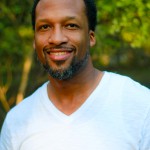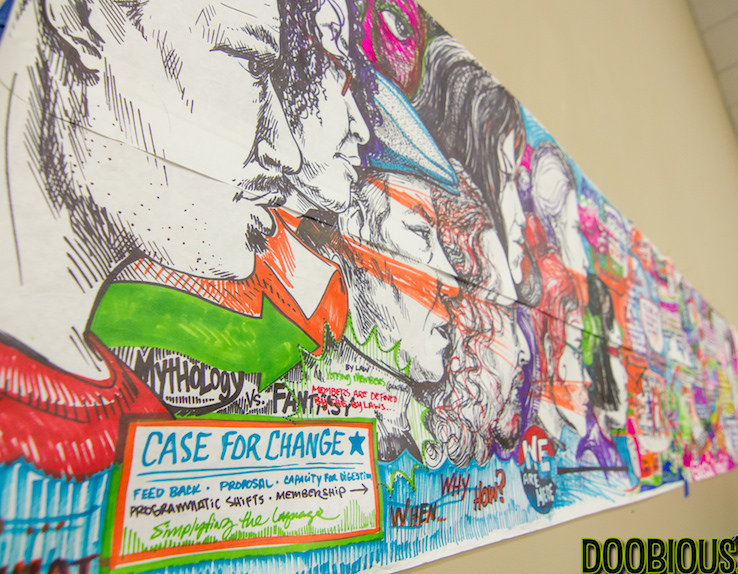By Carlton Turner, Executive Director, Alternate ROOTS (Utica, MS)
The following statements were prepared for and delivered at the Activating Networks: Changing Culture Through the Arts convening at the Ford Foundation on July 29, 2014. This program was made possible by support from The Ford Foundation, the Nathan Cummings Foundation, and the Surdna Foundation. In these comments I am speaking as a representative of the network organizations responsible for organizing this conversation. They include Allied Media Projects, Alternate ROOTS, Artspace, CultureStrike, First People’s Fund, Hemispheric Institute of Performance and Politics, National Association of Latino Arts and Culture, the National Performance Network, and YouthSpeaks.
Welcome
Thank you to President Darren Walker and the gracious staff here at the Ford Foundation. Thank you to Roberta Uno, Maurine Knighton, and Judilee Reed and the other funders present for supporting today’s convening, and thank you to those here representing your network organizations, the artists, and the many others that contributed to creating the space for this conversation.
Who are we?
Physicist Albert Laszlo Barabasi stated, “Most events and phenomena are connected, caused by, and interacting with a huge number of other pieces of a complex universal puzzle. We have come to see that we live in a small world, where everything is linked to everything else.”¹
Take a moment to look around the room and try to remember where your relationships to the people you see started. I bet if we all took some time to talk it through we would realize that there is some serious history among us, a history resting on the shared values of justice and equity — and shared hopes for our communities.
Welcome to the world of networks!
Today, these network organizations are gathered here to give us a glimpse into how they embody their mission. Across the spectrum of these diverse organizations, there are a shared number of practices. If we were to scan our websites and program materials, we would find that most of us directly support artists and the art they make. That support contributes greatly to the development of new and emerging artists and to sustaining the careers of established and veteran artists. Our organizations support the development of new art in a variety of disciplines and work to nurture contributions to a canon of new voices across the cultural landscape.
We support the presentation of new and existing work, helping artists through the producing and developmental phases of their work and connecting that work to audiences across the world. In doing so, we help to validate their work in circles they have yet to permeate. We support spaces that are as essential to the fabric of their community as the local farmer’s market or barbershop. We work with presenters to strengthen their ability to provide artists a living wage and we advocate for artists rights on a local, regional, and national stage.
We provide a space for peer development and exchange, connecting new and emerging artists to established cultural innovators through both intentional mentoring practices and by fostering a space to advance the holistic development of relationships, a place where creativity can thrive; because our networks and our work can only live through the development of long-term sustainable relationships. Relationships with people, place, and purpose.
Additionally, we support professional development and opportunities to refine the abundance of leadership in our field. We publish scholarly and participatory research of artists, the communities they serve, the art they create and the impact that work has on the world around us.
We offer a great deal of support, and funding is usually just an entry point to a much deeper relationship that, in many cases, spans decades and careers.
Now, look around the room again and try for a moment to imagine what the state of the arts would be without the organizations in this room.
There is no way to diminish the impact they have had in the arts.
I can say for certain that I would not be here if not for the legacy of these networks.
But that’s not why we are here today. There are many networks that exist to support the work of the arts. We are here because we know a better world is possible!
The great Jeff Chang writes in “Culture Before Politics:” “Cultural change is often the dress rehearsal for political change. Or put in another way, political change is the final manifestation of cultural shifts that have already occurred.”
We recognize the historic and current importance of networks in advancing social justice movements in this country. As Marco Davis states in Unstill Waters: The Fluid Role of Networks in Social Movements, “Networks are not social movements; but social justice movements need networks.”²
Our organizations stand on the shoulders of historic movements; the American Indian Movement, Civil Rights Movement, Immigration, Labor, Anti-War Movements, LGBTQ, Marriage Equality, Environmental Movements, and the universal struggle for Human Rights. We champion the importance of artists in carrying forward the traditions, beliefs, and practices of a culture and, just as important, in influencing the shape of new ideas and the ability to shift perspective, through a creative experience, just enough to seed cultural transformation.
A movement without arts and creativity at its center is a dying movement.
Many of the artists and organizations we support are working on the frontlines, deeply embedded in community, creating work, by, with, and for the people. Crafting their everyday stories of struggles and triumphs into poetry, music, sculptures, theater, dance and film. They are working on the fringe and in the mainstream, in the sanctity of the proscenium and in the anything-goes harsh realities of the streets. They are close enough to the ground to feel the tremors of change before they become seismic. As networks working at this level, we are able to make constant incremental adjustments to our practices and programs. Our networks advance a public understanding of the role of aesthetic and cultural practice in the face of systematic violence and repression. We are the first responders, the emergency workers.
Our organizations serve the most diverse portions of the country, artists historically marginalized due to geography, race, gender, age, income, etc. Add that together with our focus on equity and justice and you get the most under-resourced portion of arts philanthropy, where only 4% of the arts and culture dollars go, according to the 2011 report Fusing Arts, Culture and Social Change.³
In this age, in which we are witnessing the burgeoning understanding of our interdependence, our organizations are using network strategy to dismantle isolation and build bridges across both natural and imposed barriers. We clearly understand our role as connectors, shortening the distance between people and purpose, growing organic and intentional communities of shared value to work towards cultural transformation. Our organizations are constantly teetering on the scales of individual and collective power. We are working to develop strong individuals and linking them with growing organizations to build individual capacities to manifest collective power through action.
We care to keep the brilliant lights of change connected one to another across institutions, borders, gender, ethnicity, education, and class.
Necessity is truly the mother of invention and our organizations, especially those working with historically under-resourced communities, have, since our inception, been dealing with many of the issues that are beginning to plague the mainstream. And we are working to support both traditional and contemporary approaches to creative problem solving in an attempt to turn those challenges into opportunities for creative visioning.
Little known fact: most of our organizations were supporting place before it was cool.
Unfortunately, too often, others define our traditions and cultural approach as their own innovative practice. The language they use to define our work becomes the blueprint for the next funding trend. A trend we usually find ourselves on the outside of, having to adopt their version of our language to legitimize our work to those working far away from the front lines.
Our networks form an ecosystem that supports an expanding social justice movement, and we have established ourselves as a necessary element of the whole, understanding the role of arts and culture in igniting and sustaining a 21st century movement for change. We are actively striving to create equitable infrastructures for artists and organizations working beyond the dominant paradigm. Not because of funding trends or position papers, but because our foundations are fundamentally linked to champions of authentic voice, cultural traditions, and the aesthetics of equity.
Artists are the archivists of time. Give an artist a minute and they create a sensory experience that can make a moment last for a lifetime. Through strategic networking we weave those moments into a movement, finding solidarity and solace in standing on the right side of history.
¹ Peter Plastrik and Madeline Taylor, Network Power for Philanthropy and Nonprofits. (Barr Foundation, 2010) p. 6. Original Barabasi quote: Albert-Laszlo Barabasi, Linked: The New Science of Networks (Cambridge, Massachusetts: Perseus Publishing, 2002), p. 7.
² Robin Katcher, Unstill Waters: The Fluid Role of Networks in Social Movements. (The Nonprofit Quarterly, Summer 2010) p. 52.
³ Holly Sidford, Fusing Arts, Culture, and Social Change: High Impact Strategies for Philanthropy. (National Committee for Responsible Philanthropy, 2011) p. 9.
________
 Carlton Turner is the Executive Director of Alternate ROOTS, a regional non-profit arts organization based in the south. Carlton has been a member of Alternate ROOTS since 2001 and has served on the organization’s board as a Regional Representative, and as an officer. Carlton Turner is also co-founder and co-artistic director, along with his brother Maurice Turner, of the group M.U.G.A.B.E.E. (Men Under Guidance Acting Before Early Extinction) (turnerworldaround.org). M.U.G.A.B.E.E. is a performing arts group that blends jazz, hip-hop, spoken word poetry and soul music together with non-traditional storytelling. Carlton is the husband of Brandi Turner and the father of Jonathan and Xiauna Lin.
Carlton Turner is the Executive Director of Alternate ROOTS, a regional non-profit arts organization based in the south. Carlton has been a member of Alternate ROOTS since 2001 and has served on the organization’s board as a Regional Representative, and as an officer. Carlton Turner is also co-founder and co-artistic director, along with his brother Maurice Turner, of the group M.U.G.A.B.E.E. (Men Under Guidance Acting Before Early Extinction) (turnerworldaround.org). M.U.G.A.B.E.E. is a performing arts group that blends jazz, hip-hop, spoken word poetry and soul music together with non-traditional storytelling. Carlton is the husband of Brandi Turner and the father of Jonathan and Xiauna Lin.

